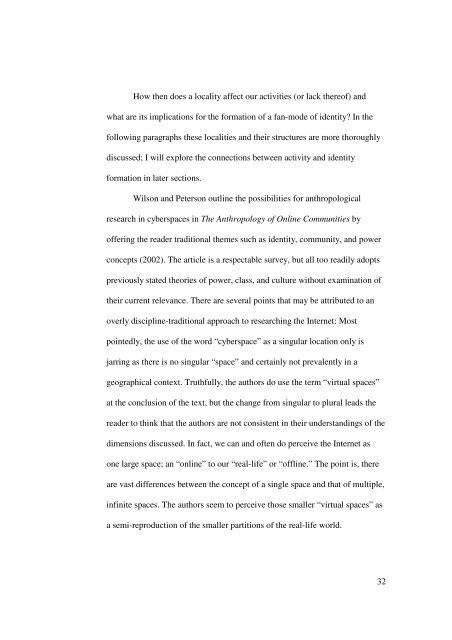Girls who like Boys who like Boys – Ethnography of ... - Yuuyami.com
Girls who like Boys who like Boys – Ethnography of ... - Yuuyami.com
Girls who like Boys who like Boys – Ethnography of ... - Yuuyami.com
You also want an ePaper? Increase the reach of your titles
YUMPU automatically turns print PDFs into web optimized ePapers that Google loves.
How then does a locality affect our activities (or lack there<strong>of</strong>) and<br />
what are its implications for the formation <strong>of</strong> a fan-mode <strong>of</strong> identity? In the<br />
following paragraphs these localities and their structures are more thoroughly<br />
discussed; I will explore the connections between activity and identity<br />
formation in later sections.<br />
Wilson and Peterson outline the possibilities for anthropological<br />
research in cyberspaces in The Anthropology <strong>of</strong> Online Communities by<br />
<strong>of</strong>fering the reader traditional themes such as identity, <strong>com</strong>munity, and power<br />
concepts (2002). The article is a respectable survey, but all too readily adopts<br />
previously stated theories <strong>of</strong> power, class, and culture without examination <strong>of</strong><br />
their current relevance. There are several points that may be attributed to an<br />
overly discipline-traditional approach to researching the Internet: Most<br />
pointedly, the use <strong>of</strong> the word “cyberspace” as a singular location only is<br />
jarring as there is no singular “space” and certainly not prevalently in a<br />
geographical context. Truthfully, the authors do use the term “virtual spaces”<br />
at the conclusion <strong>of</strong> the text, but the change from singular to plural leads the<br />
reader to think that the authors are not consistent in their understandings <strong>of</strong> the<br />
dimensions discussed. In fact, we can and <strong>of</strong>ten do perceive the Internet as<br />
one large space; an “online” to our “real-life” or “<strong>of</strong>fline.” The point is, there<br />
are vast differences between the concept <strong>of</strong> a single space and that <strong>of</strong> multiple,<br />
infinite spaces. The authors seem to perceive those smaller “virtual spaces” as<br />
a semi-reproduction <strong>of</strong> the smaller partitions <strong>of</strong> the real-life world.<br />
32


